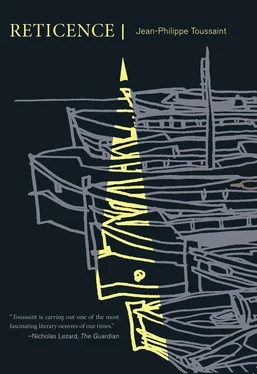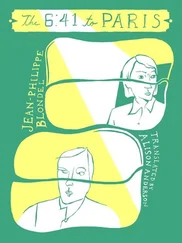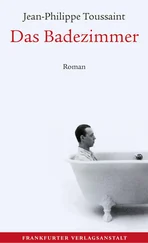I was now standing in front of room sixteen, holding the key I’d just taken from the reception, and I didn’t make a move, fully persuaded that it was Biaggi’s room, that this was the room he’d moved into when he came to stay at the hotel, and that it was here that he’d been working in complete isolation for several days now. He must have gone out, no doubt to take a walk around the village, because I couldn’t hear a sound behind the door, and I made up my mind to go in now that he was out. Softly I slid the key into the lock, and pushing open the door I was so convinced I was entering Biaggi’s room that I was sure I’d find a dark little nook under the attic with no more than a small wooden table against the wall with Biaggi’s typewriter on it, the black plastic cover overturned on the table, an ashtray and several sheets of paper on the desk. There was none of all that, judging from the rayon dressing gown on a hanger beside the washbasin the room was occupied by a woman. The wallpaper was similar in every respect to that in my room, just as dingy and damp, and the same grimy orange-beige color. The bed was unmade and the curtains were open, and a suitcase lay on the floor against the wall. Very elegant, the suitcase contrasted somewhat with the modesty of the room. It was made of soft, padded blue leather and had gold-colored locks, and a tiny key was attached by a wire to the handle. I closed the door and was about to go back downstairs when I heard someone walking along the hall down below, who almost immediately started up the little staircase. I stood there transfixed in the hallway, and the owner appeared in front of me at the top of the stairs, a little out of breath, holding a bucket and broom to clean the rooms. Was it you, I blurted out, who closed the sliding window in the dining room last night while I was out? He seemed not to understand the question, or at least not to make the connection between the window and the fact that I’d been outside the previous night, or maybe he was making other connections in his mind whose consequences I had no way of grasping, and after thinking about it while giving me a strange look, he finally said that yes, in fact he had gotten up in the night because he’d heard some noise in the hotel, and that, when he came into the dining room, he’d seen that a cat had taken advantage of the window’s being open to slip inside — a black cat that had run away as soon as he’d entered the room.
So it was the owner who’d closed the window the night before. Unless, I thought, without having really lied to me, he’d avoided telling the entire truth to cover up to a certain extent Biaggi’s presence at the hotel, and that last night when he went into the dining room he knew very well that Biaggi was still outside, simply because he’d heard him leave a short while earlier, and that, realizing that the sliding window was open in the dining room, he must have thought that it was Biaggi who’d left it open and so hadn’t touched it. And so it was Biaggi who, having preceded me into the hotel on his way back from the port, had closed the sliding window on me, not staying outside on the terrace as I’d thought, but simply coming back into the hotel where he had a room. Because, if Biaggi was staying at the hotel, I thought, if Biaggi had moved into the hotel a couple of days before my arrival with the intention of working there in complete isolation for a spell, he certainly must have asked the owner to tell no one he was there so that he could work in peace and quiet.
Back in my room I went over to the window and looked pensively outside. My son was sleeping behind me, I could hear him breathing regularly in his travel cot, and I went soundlessly over to watch him sleep. He was lying on his back, his little eyes closed and his hands limp, and I watched tenderly as he slept, even somewhat surprised I must say, he slept more than anyone I knew. He woke up a little after eleven o’clock in a soft, almost imperceptible fit of hiccups and tears that grew louder bit by bit, becoming clipped and furious as he tried to straighten up in bed with his head and hands pressed against the finely stitched fabric of the little Centre Georges Pompidou. I took him in my arms and held him high in the air, just the way he liked it to judge from his sudden silence and blissful, toothless smile, before putting him down softly on my bed and getting him dressed to go out, slipping on his big anorak and little shoes. I waited until he was in the stroller before I put on his balaclava (it was always a bit of a bullfight). We didn’t run into anyone when I dropped off my key at the front desk, and I picked up his stroller and carried it down the front steps. The stroller was brand new, very light and very practical, and I was really rather proud of it, having bought it just a few days before I left home. It had a chrome-plated metal frame and pale green plastic trimmings, with very solid rubber wheels. The color of the seat was perhaps not as uniform as I’d have liked, because when I bought things for my son I generally looked for the greatest simplicity, preferring simple materials and plain fabric, whereas this was many shades of gray and splashed with a whole nebula of jungle animals, tigers and elephants, even if they were really rather little and quite discreet I must say, blending in pretty well with the rest of the thing. In any event it was very easy to maneuver, even if there was only one handle — the other had broken off the day I arrived and was still in my pocket, together with a wheel clip that had come off two days ago. The road rose slightly and the wheels squeaked (that was new). I stopped for a moment on the shoulder and bent down to see what was wrong, but not finding anything that could explain the squeaking sound I started walking again. Probably wear and tear, who knows. I walked calmly along the side of the road, my son holding his head high as if I’d put him on the lookout at the head of our convoy, a task he carried out with the utmost seriousness, his eye sweeping the terrain under his balaclava — just one eye, because his hood had slipped down and more or less covered the other — watching for anything that moved in front of him, be it nothing more than a dead leaf carried by the wind, whose peregrinations he followed attentively from the asphalt where it had commenced its flight to its final destination on the roadside where it was caught by a clump of wet grass.
A fine sliver of sunlight had found its way between the clouds, and we finally passed the battered little sign indicating we were leaving Sasuelo. Right beside the sign on the side of the road was the municipal dump, consisting of a simple wire container on the side of the road. The cover was open and hung down one side, and the cage was overflowing with cardboard boxes and more or less well tied garbage bags. Some of them, fastened elegantly with little pink ribbons, had been particularly fawned over before being discarded, while others were wide open, sometimes even ripped, whose contents — open food cans, potato peels, shards of broken glass, fish bones, and chicken carcasses — were spilled all over the ground. The rain had soaked everything, and most of the cardboard boxes were drenched and had burst in places, finally splitting altogether under the weight of the garbage. A foul odor hung in the air and only let up a hundred yards farther on, when the sea air finally regained the upper hand. I continued along the cliff and, as I approached the Biaggis’ house — because I was now starting to get close to the Biaggis’ house — I started to feel a sort of apprehension at the thought of being surprised so close to their property. However it seemed no one was following us, and the road was now lined on both sides by a dense grove of trees. Soon the wall of the property appeared between the pines, a large wall of irregular stones almost entirely covered by a coat of dried ivy, and I walked alongside it for a couple of yards. The first thing I saw when I stopped in front of the gate was that the old gray Mercedes was gone. It had still been there the night before, however, so someone must have driven off in it this morning, and everything pointed to that person being Biaggi. Because even if Biaggi was staying at the hotel, I thought, even if Biaggi had moved into the hotel a couple of days before I arrived, nothing would stop him from coming and going in the village as he pleased or from using his car from time to time. He could even go home every day if he liked, and stay there for a couple of hours without opening the shutters, sure that no one would suspect he was there. So in fact he could alternate between two separate locations in the village, his home and his room at the hotel, and it occurred to me then that he must certainly have gone from his house to the hotel several times since I’d arrived, meaning that each time he wasn’t at the hotel he’d no doubt been at home.
Читать дальше












